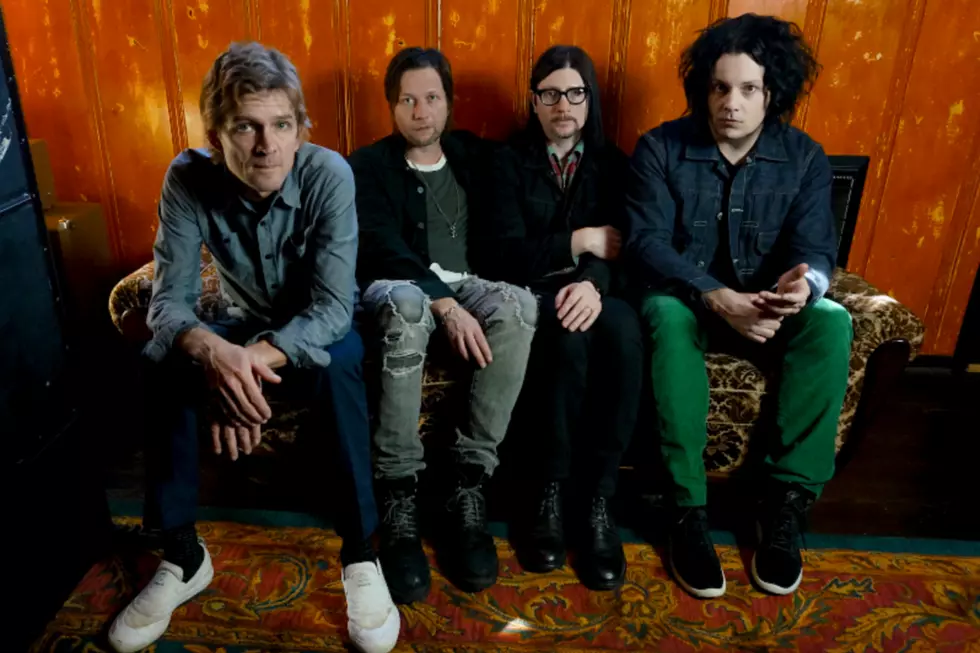
Why the Raconteurs Rush-Released ‘Consolers of the Lonely’
Jack White was pissed off in May 2007. While on tour with the White Stripes in Spain, he learned that a poorly recorded bootleg of the band’s forthcoming album, Icky Thump, was coursing its way around the internet.
Whether the singer-guitarist was more upset about the wretched sound quality or the two-weeks-early leak of the Stripes’ new record, he directed all of his ire towards the Chicago DJ who had shared Q101’s advance copy of the whole album on the airwaves – resulting in heavily downloaded bootleg rip. White made a long-distance call to Chicago to excoriate the disk jockey, telling her that her impulsive decision had “messed up for the entire [music] business.”
For a musician obsessed not just with quality control (he was already preaching the pleasures of vinyl), but just flat-out control (strictly adhering to a limited color palette when playing with different projects), this sort of leak was frustrating. White vowed to do his best not to allow it to happen again.
Less than a year later, White was putting together the second album by the Raconteurs, his “indie-rock supergroup” with Brendan Benson, Jack Lawrence and Patrick Keeler. Upon wrapping up work in early March, the boys decided to avoid the usual music industry build-up for a big, new record (interviews, performances, promotion… and the potential for internet leaks) by fast-tracking it for release – within the month. On March 17, the Raconteurs revealed that their anticipated new album, Consolers of the Lonely, would be available on CD and vinyl or as a digital download in about a week, on March 25, 2008.
“The band have done no interviews or advertisements for this record before this announcement,” the Raconteurs said in an official statement. “The purpose: to get the album to the fans as soon as possible and as we promised. We wanted to get this record to fans, the press, radio, etc., all at the EXACT SAME TIME so that no one has an upper hand on anyone else regarding its availability, reception or perception.”
Regardless of the Raconteurs’ stated reasons for the quick release, the entertainment industry didn’t usually do things this way. Projects with the potential to be vastly popular were given a massive push. Only things like terrible movies went unscreened for critics, in the hope that the flicks made money before word got out that they stunk. Yet, the previous fall, Radiohead had released In Rainbows with only 10 days’ notice (in addition to a unique pay-what-you-want proposition).
With little time and even less music to go on, the media focused on the record’s title, Consolers of the Lonely, with rock writers reporting that the inspiration appeared to be the United States Postal Service. Credited to writer Charles William Eliot, an inscription on a Washington, D.C. post office reads: “Messenger of sympathy and love, servant of parted friends, consoler of the lonely, bond of the scattered family, enlarger of the common life.”
Rumors flew. Was the album going to have a postal theme? Or, more likely, was it going to revolve around the ideas in Eliot’s quote? As it turned out, not really. The best connection one could draw was that, in a technology-driven world, the post office was the way of the past; on Consolers of the Lonely, the Raconteurs were reveling in the musical past. That fact was emphasized by the album’s cover art, which showed the band members posing for a photo that appeared to be circa 1900 (or one that would have been taken of Bob Dylan and the Band).
As with Dylan and the Band, some of the music seemed steeped in old-timey Americana – country, blues and soul; fiddles, banjos and the Memphis horns; “Old Enough,” “Carolina Drama” and “Many Shades of Black.” But Consolers of the Lonely also sounded rooted in the ’70s, from Zeppelin-like riffage (matched with the keening wails of Benson and White) to proggy exercises (which took rustic rock to epic conclusions) and a ragged sprawl worthy of the Rolling Stones’ Exile on Main St.
It was looser, louder, and more boisterous than the Raconteurs’ 2006 debut album, and they seemed to be having more fun this time around. There was even a song (“These Stones Will Shout”) that recalled the good-time groove of Three Dog Night’s “Shambala.”
Due to a mistake on iTunes, the album still leaked, but it didn’t seem to be as big of a deal this time. Fans and critics (operating on practically the same time-table) each reacted positively. For the most part, the media praised the album as better than the Raconteurs’ 2006 debut, Broken Boy Soldiers, while listeners pushed it to #7 in the U.S. and #8 in the U.K., despite the lack of a radio-ready single like “Steady, As She Goes.” The Raconteurs might have not done anything in advance of the album’s release, but they promoted it with a big tour that included stops at that year’s Coachella, Bonnaroo, Glastonbury, Montreux Jazz Festival and Lollapalooza.
In the end, they showed the music industry that a “surprise” album drop could still be a success. The years since have witnessed instantaneous releases from the likes of David Bowie, Beyoncé, Pixies and many others.
“I’ve never done the right business move, I’ve always done what I have to do. If it happens to coincide with what looks like good business, then that’s nice,” White told Uncut in 2012. “The Raconteurs’ second album; we released it without telling anyone it existed – that’s a horrible business move. Are these regrets? Absolutely not!”




